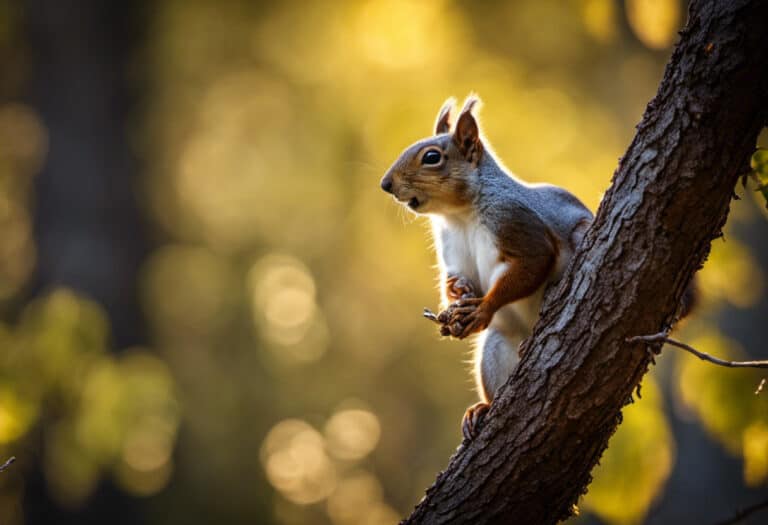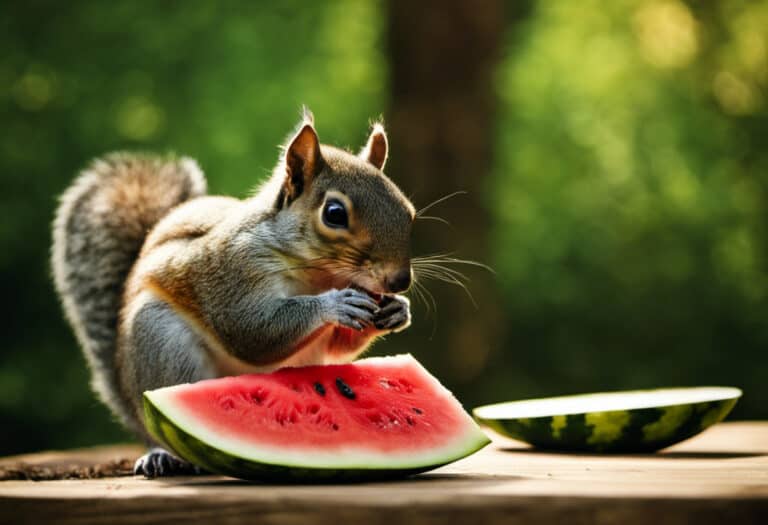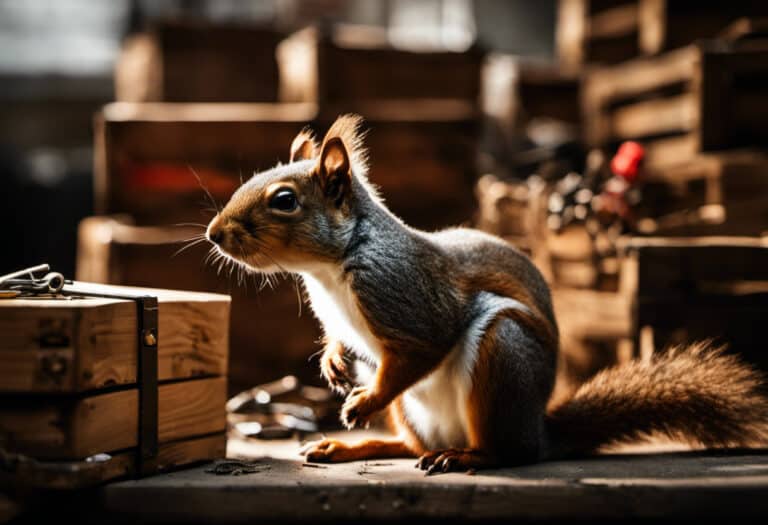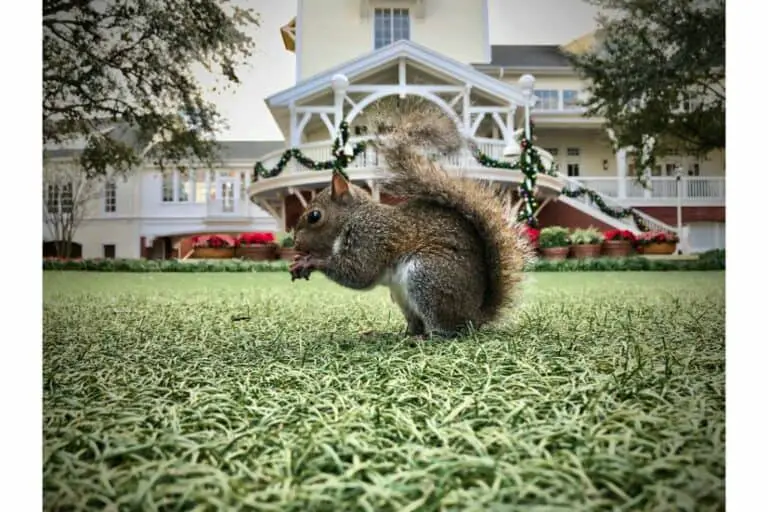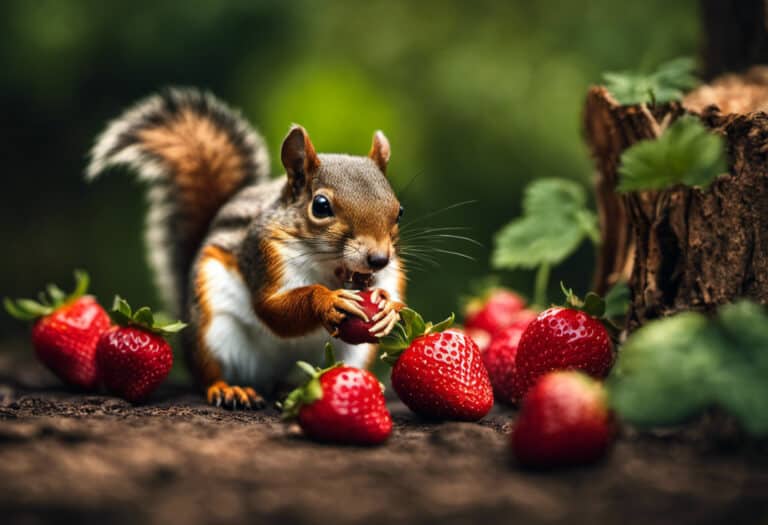Can Squirrels Eat Apples?
Curious about whether you should share your apple harvest with squirrels? This informative article will explore squirrels’ eating habits and relationship with apples.
Squirrels, known for their varied diets and adaptability, have a knack for finding and devouring tasty treats. But can squirrels eat an apple? Are there any dangers involved? We’ll answer these questions and provide valuable insights into squirrels’ world and eating habits.
Keep reading to discover the truth about squirrels and apples.
Key Takeaways
- Squirrels enjoy eating apples, including crab apples, but rotting apples can be toxic for them.
- Squirrels eat other fruits, such as apricots, bananas, cherries, figs, lemons, mangoes, oranges, peaches, pears, plums, and watermelons.
- Feeding squirrels natural foods is essential for their health, so avoiding excessive sugar or processed foods is best.
- When offering fruits to squirrels, removing apple cores and seeds is recommended, such as limiting the number of bananas due to their high sugar content and considering using a squirrel feeder or scattering the fruits in the garden.
Types of Squirrels That Eat Apples
You may be interested to know that both ground squirrels and red squirrels are types of squirrels that enjoy eating apples. When it comes to apple varieties, squirrels aren’t picky eaters. They’ll happily munch on any apple variety, including crab apples.
However, it’s important to note that squirrels shouldn’t consume rotting apples, which can harm their health.
Apples and other fruits like apricots, bananas, cherries, and oranges are a favorite among squirrels. Feeding squirrels natural foods like apples is essential for their overall health.
It’s advised to remove apple cores and seeds before offering them to squirrels and to limit the amount of bananas due to their high sugar content.
Squirrels’ Favorite Fruits and Their Eating Habits
Satisfying your hunger with various fruits, squirrels enjoy indulging in a wide range of juicy and flavorful options. Regarding apples, many squirrels are affixed to this delicious fruit. Ground squirrels, flying squirrels, red squirrels, and different species of grey squirrels have all been observed eating apples.
Whether a crisp Gala or a tart Granny Smith, squirrels will happily munch on any apple, including crab apples. However, it’s important to note that while squirrels may eat rotting apples, it can be toxic. Rotting apples can contain mold and fermentation byproducts that harm their health.
Therefore, it’s best to provide fresh, ripe apples to squirrels to ensure their well-being- and enjoyment of this tasty treat.
Can Squirrels Eat Rotting Apples
Can squirrels eat rotting apples?
While squirrels enjoy eating various fruits, including apples, it’s important to note that feeding them rotting apples can be toxic and pose risks to their health.
Instead, consider offering fresh, ripe apples or other alternative fruits to ensure the well-being of these furry creatures.
Toxicity of Rotting Apples
Consuming rotting apples can be toxic for squirrels. When apples deteriorate, they produce ethanol and other harmful compounds that can harm a squirrel’s health. The risks of feeding rotting apples to squirrels include digestive issues, such as diarrhea, stomach upset, and potential liver damage.
On the other hand, feeding fresh apples to squirrels can provide several benefits. Apples are a good source of vitamins and minerals, including vitamin C and potassium, essential for a squirrel’s overall health. They also contain dietary fiber, which aids in digestion.
However, it’s important to note that apples should be given in moderation as part of a balanced diet, along with other natural foods that squirrels enjoy.
Risks for Squirrels
Feeding rotting apples to these creatures can harm their health, so it’s best to avoid offering them. While squirrels enjoy eating apples, consuming rotting ones can harm their well-being. Rotting apples can contain harmful bacteria and toxins that may lead to digestive issues and potential poisoning in squirrels.
Instead of offering rotting apples, there are alternative options to provide a nutritious diet for squirrels. Fresh, ripe fruits like apricots, bananas, cherries, figs, lemons, mangoes, oranges, peaches, pears, plums, and watermelons can be suitable. Removing apple cores and seeds before feeding squirrels is crucial to prevent choking hazards.
Providing fruits in a squirrel feeder or scattering them in the garden can also be beneficial. Remember to limit the amount of bananas due to their high sugar content.
Alternatives to Rotting Apples?
You may consider offering fresh, ripe fruits as an alternative to rotting apples for a nutritious diet for these creatures. Here are some safe fruit options that can provide a variety of nutrients for squirrels:
- Berries: Squirrels enjoy the sweet taste and juiciness of strawberries, blueberries, and raspberries. These fruits are rich in antioxidants and vitamins.
- Melons: Offering slices of watermelon or cantaloupe can be a refreshing treat for squirrels, especially during hot summer days. These fruits are hydrating and contain vitamins A and C.
- Grapes: Squirrels can feast on juicy grapes, whether green, red, or purple. Grapes are a good source of hydration and contain antioxidants that promote overall health.
Other Fruits Squirrels Enjoy
Other fruits that squirrels enjoy include:
- Berries such as strawberries, raspberries, and blueberries.
- They’re also known to eat grapes, both green and red varieties.
- Additionally, squirrels have been observed consuming melons such as cantaloupe and honeydew.
These fruits provide squirrels with essential nutrients and hydration, making them a valuable part of their diet.
Safe Fruit Options
Squirrels can safely eat various fruits, including apples, apricots, bananas, cherries, figs, lemons, mangoes, oranges, peaches, pears, plums, and watermelons.
Regarding types of squirrels that eat apples, both ground squirrels and grey squirrels have been observed indulging in this juicy fruit. However, it’s important to note that while squirrels may eat rotting apples, it can be toxic. Rotting apples can contain molds and toxins that can harm their health.
It’s always best to provide fresh and ripe apples to squirrels, ensuring their well-being. Squirrels have a diverse palate and enjoy a variety of fruits, including those mentioned earlier. Offering them a balanced diet of natural foods is crucial for their health and should be prioritized.
Discarded Fruit Parts
When discarding the center pit of apricots and cherries, it’s important to remember that squirrels often play a role in dispersing these seeds.
Although these discarded fruit parts may seem insignificant, they can pose certain risks for squirrels. To better understand these risks, let’s take a closer look at the table below:
| Discarded Fruit Parts | Risks for Squirrels |
|---|---|
| Apricot center pit | Choking hazard |
| Cherry center pit | Choking hazard |
Squirrels habitually consume the flesh of apricots and cherries, leaving behind the hard center pits. These pits can be small enough to cause choking if squirrels attempt to eat them.
To minimize the risks for squirrels, it is recommended to remove these center pits before discarding the fruit parts. By doing so, we can help ensure the safety and well-being of our furry friends.
Feeding Guidelines for Squirrels?
If you want to provide a healthy diet for squirrels, it’s essential to offer a variety of fruits and avoid excessive sugar or processed foods. Feeding baby squirrels requires special attention and guidelines. Here are some critical points to consider:
- Gradually introduce solid foods after six weeks, starting with soft options.
- Avoid feeding baby squirrels cow’s milk or soy milk, as it can lead to health issues.
- To ensure a balanced diet, offer a mix of fruits, such as apples, bananas, and pears.
When it comes to squirrel feeder options, there are a few choices to consider:
- Traditional feeders with openings for squirrels to access the food.
- Platform feeders that provide a larger surface area for squirrels to eat comfortably.
- Hanging feeders that can be suspended from trees or poles.
Various feeding options can enhance the squirrels’ foraging experience and keep them engaged. Remember to clean and refill the feeders regularly to maintain hygiene.
Discarding Pit of Apricots and Cherries
It would be best to discard the center pit of apricots and cherries before feeding them to squirrels. The discarded hole of these fruits poses risks for squirrels if ingested.
The pit contains a hard outer shell that can cause choking hazards and blockages in the digestive system. Additionally, the hole contains cyanide compounds, which can be toxic to squirrels if consumed in large quantities. Cyanide can interfere with oxygen transport in the body, leading to severe health issues.
It’s essential to remove the pits to ensure the safety and well-being of squirrels. When feeding apricots and cherries to squirrels, always remember to remove the pits beforehand to prevent any potential risks and keep the squirrels healthy.
Can Squirrels Digest Banana Peels
Squirrels can safely digest banana peels but may have difficulty breaking them down quickly. It’s important to note that while banana peels aren’t toxic to squirrels, they may cause digestive issues if consumed in large quantities.
Feeding squirrels natural foods, including fruits like bananas, gives them essential nutrients and promotes overall health. The high fiber content in banana peels can aid in regulating their digestive system. Additionally, natural foods are free from artificial additives and excessive sugar, which can harm squirrels’ health.
Grey Squirrels and Their Preference for Pears and Plums
Grey squirrels, a common squirrel species, have been observed to prefer pears and plums. Research has shown that these squirrels are more interested in consuming these fruits than other varieties.
Understanding their food preferences can help create suitable environments and provide appropriate food sources for grey squirrels.
Grey Squirrels and Plums
When it comes to plums, grey squirrels are more interested in devouring them than any other type of squirrel. These graceful creatures are known for their voracious appetite and diverse food preferences.
Regarding fruit consumption, grey squirrels have shown a particular fondness for pears and plums. Their love for these juicy fruits is unmatched, making them the top contenders for plum consumption.
The sight of these squirrels feasting on plums can evoke a range of emotions in the audience:
- Amusement: Watching these agile creatures navigate tree branches and devour plums can bring joy and entertainment.
- Fascination: Observing the precision with which grey squirrels handle plums can spark curiosity and admiration for their talent.
- Appreciation: Witnessing squirrels relishing plums can foster a deeper appreciation for the natural world and its intricate interactions.
Grey squirrels’ affinity for plums highlights their adaptability and ability to find sustenance in diverse environments.
Squirrels and Pear Preference
You might be surprised that pears are the preferred fruit for many squirrels. While they enjoy a variety of fruits, squirrels have shown a particular fondness for pears, especially the grey squirrels.
These furry creatures have been observed to choose pears over other fruits, including citrus fruits like oranges and lemons.
To further understand squirrels’ preferences, let’s look at a table showcasing their citrus preferences and strategies for deterring them from fruit trees.
| Squirrel Citrus Preferences | Strategies for Deterring Squirrels |
|---|---|
| Oranges | Using nets to cover fruit-bearing tops of trees |
| Lemons | Making tree trunks unclimbable and regularly cleaning fallen or rotting fruits |
| Grapefruits | Scaring squirrels away using giant plastic owl statues or scarecrows |
| Limes | Spraying hot pepper or apple cider vinegar on trees |
Do Squirrels Eat Pears?
Do squirrels eat pears? The answer is yes. Squirrels are opportunistic eaters and will gladly consume various fruits, including pears. They’re particularly attracted to the sweetness of ripe pears and may even target citrus fruits like oranges and lemons.
However, preventing squirrels from damaging fruit trees is crucial for tree health and production. Here are some strategies to consider:
- Implement physical barriers:
- Install smooth metal collars around tree trunks to prevent squirrels from climbing.
- Use nets to cover the fruit-bearing tops of trees, discouraging squirrels and birds.
- Deterrents with scents:
- Squirrels dislike the smell of hot pepper. Sprinkle it around the tree or create a pepper spray solution.
- Apple cider vinegar can also be effective in deterring squirrels.
- Regular maintenance:
- Clean up fallen or rotting fruits to reduce squirrel attraction.
- Trim tree branches away from nearby structures to limit squirrel access.
Importance of Feeding Squirrels Natural Foods
Feeding squirrels natural foods is essential for their health and well-being. Regarding apples, various types of squirrels show an affinity for this fruit. Ground squirrels, flying squirrels, red squirrels, and different species of grey squirrels all enjoy consuming apples.
However, there are risks involved in feeding squirrels apples. While they’ll eat any variety, including crab apples, squirrels shouldn’t consume rotting apples as they can be toxic.
Removing apple cores and seeds before offering them to squirrels is essential. Additionally, limiting the amount of bananas given to squirrels is recommended due to their high sugar content.
Feeding squirrels natural foods is crucial for their overall health, so be mindful of the risks associated with apple consumption.
Avoiding Excessive Sugar and Processed Foods
When it comes to feeding squirrels, avoiding excessive sugar and processed foods is essential. These foods can pose risks to their health and lead to various health issues.
- Excessive sugar consumption can lead to obesity in squirrels, just like in humans. This can result in decreased mobility and overall health.
- Processed foods often contain high levels of sodium, which can harm squirrels. It can lead to dehydration and electrolyte imbalances.
- Additionally, processed foods lack the nutrients squirrels need for optimal health. This can result in deficiencies and weakened immune systems.
To ensure the well-being of squirrels, providing them with natural, nutrient-rich foods is crucial. This will help them maintain a balanced diet and avoid the potential health issues associated with excessive sugar and processed foods.
Removing Apple Cores and Seeds Before Feeding
To ensure the health and well-being of squirrels, removing apple cores and seeds before feeding them is essential.
Apple cores can be complex for squirrels to digest, potentially leading to digestive issues and discomfort.
Additionally, apple seeds contain trace amounts of cyanide, which can be toxic to squirrels if consumed in large quantities.
Apple Cores and Digestion
Squirrels can digest apple flesh easily, but apple cores should be removed before feeding. Feeding squirrels rotting apples can pose risks to their health. It’s important to consider alternatives to feeding squirrels rotting apples. Here are three reasons why:
- Nutritional Value: Rotting apples lose their nutritional value and can harm squirrels. Providing fresh, ripe apples ensures that squirrels receive the nutrients for their well-being.
- Digestive Issues: Rotting apples can cause digestive issues in squirrels, leading to discomfort and potential health problems. Removing the apple cores helps prevent any digestive complications.
- Toxicity: As apples rot, they can produce toxins harmful to squirrels. By avoiding feeding squirrels rotting apples, you can protect them from potential toxicity.
Instead of offering rotting apples, consider providing fresh fruits like apricots, bananas, or cherries. These alternatives aren’t only safer but offer various nutrients for the squirrels’ diet.
Seed Toxicity in Squirrels
If you notice any signs of seed toxicity in your furry friends, seeking immediate veterinary care is crucial.
Seed toxicity in squirrels can pose severe risks to their health. While squirrels enjoy eating fruits like apples, the seeds within them can be toxic.
Apple seeds contain amygdalin, which can release cyanide when metabolized. Cyanide is a potent poison that can cause severe respiratory distress, seizures, and even death in squirrels.
To protect your squirrels from seed toxicity, removing the apple cores and seeds before feeding them is advisable. Alternatively, you can offer them slices of apple without the seeds.
Providing a variety of safe fruits, such as bananas, apricots, and oranges, can be a healthier alternative to apples for squirrels.
Always prioritize your furry friends’ well-being and ensure their diet is free from potential risks.
Feeding Fruits in a Squirrel Feeder or Scattering in the Garden
When offering fruits in a squirrel feeder or scattering them in the garden, limiting the amount of bananas is essential due to their high sugar content.
Squirrels aren’t picky eaters and have many favorite foods, including corn, mushrooms, squash, apples, oranges, apricots, and avocados.
Regarding fruit consumption, squirrels enjoy eating apples of any variety but shouldn’t be given rotting apples as they can be toxic. Squirrels also consume apricots, cherries, figs, lemons, mangoes, oranges, peaches, pears, plums, and watermelon.
It’s interesting to note that squirrels discard the center pit of apricots and cherries and love sour citrus fruits like lemons. Grey squirrels, in particular, are more interested in pears and plums.
Providing squirrels with natural foods and avoiding excessive sugar or processed foods is crucial.
Limiting the Amount of Bananas for Squirrels
When offering fruits in a squirrel feeder or scattering them in the garden, you should be mindful of limiting the amount of bananas due to their high sugar content.
While squirrels enjoy a variety of fruits, excessive banana consumption can be detrimental to their health. Bananas are known for their high sugar content, which can lead to weight gain and dental issues in squirrels.
Additionally, bananas can be difficult for squirrels to digest correctly.
It’s essential to prioritize the overall health and well-being of squirrels by providing them with a balanced diet that includes a variety of fruits while limiting the amount of high-sugar options such as bananas. By doing so, you can ensure that squirrels maintain a healthy diet and avoid potential health problems.
Regarding apple tree protection, squirrels are known to climb apple trees to acquire fruit. This can lead to damage to the tree limbs and a reduction in fruit production.
To protect apple trees from squirrels, some farmers use smooth metal collars or spray hot pepper on the trees. These methods create a barrier that deters squirrels from climbing and damaging the trees.
Additionally, scaring squirrels away using giant plastic owl statues or scarecrows can keep them away from the apple trees.
Regularly cleaning fallen or rotting fruits and making the tree trunks unclimbable can also help protect the trees from squirrel interference. By implementing these measures, farmers can preserve the health and productivity of their apple trees.
Squirrels and Their Climbing Ability on Apple Trees
You can observe the impressive climbing ability of squirrels as they effortlessly ascend apple trees to access their desired fruit.
This behavior, although fascinating, can result in apple tree damage. Squirrels jump from branch to branch, causing limbs to break or weaken.
Additionally, they may gnaw on the bark, further harming the tree. It’s essential to understand squirrel behavior on apple trees to protect the trees and ensure their healthy production.
Here are a few key points to consider:
- Squirrels are agile climbers, using their sharp claws and strong hind legs to navigate the tree branches.
- They can jump several feet between branches, making it easy for them to reach the apples.
- Squirrels have a keen sense of smell and can detect ripe fruit from a distance, attracting them to apple trees.
Understanding squirrel behavior and implementing appropriate measures can help mitigate apple tree damage caused by these graceful creatures.
Protecting Fruit Trees From Squirrels
You can use smooth metal collars or spray hot pepper on the trees to protect your fruit trees from damage and reduce the risk of reduced production.
Smooth metal collars provide a physical barrier that prevents squirrels from climbing up the trunk and accessing the fruit. These collars should be installed around the tree’s base, ensuring a secure fit.
Additionally, spraying hot pepper on the trees can deter squirrels due to their aversion to the strong scent and taste.
Another option is to place plastic owl statues near the trees, as squirrels are intimidated by their presence and tend to avoid areas where predators may be present.
Feeding Guidelines for Baby Squirrels
Feeding baby squirrels with cow’s or soy milk can lead to health and developmental problems. Following proper guidelines for baby squirrel nutrition and introducing solid foods is essential. Here are some key points to consider:
- Nutritional Needs:
- Baby squirrels require a diet that mimics their natural food sources.
- A balanced diet should include proteins, fats, carbohydrates, vitamins, and minerals.
- Consult with a wildlife sanctuary or veterinarian for specific dietary recommendations.
- Gradual Introduction of Solid Foods:
- Solid foods should be introduced gradually after six weeks of age.
- Start with soft foods like fruits and vegetables, mashed or pureed for easy digestion.
- Offer a variety of foods to ensure a well-rounded diet.
- Monitoring and Adjusting:
- Observe the baby squirrels’ response to the new foods and adjust as needed.
- Please keep track of their weight and overall health to ensure proper growth and development.
Frequently Asked Questions
Can Squirrels Eat Rotting Apples?
Squirrels can eat rotting apples, but it can be toxic for them. It’s essential to consider their diet. Squirrels are not picky eaters and enjoy a variety of fruits. However, feeding them natural foods is best for their health.
Can Squirrels Digest Banana Peels?
Squirrels can’t efficiently digest banana peels. Feeding them natural foods is beneficial for their health. A diet of fruits like apples and other squirrel-friendly options meets their nutritional needs.
What Fruits Do Grey Squirrels Prefer?
Grey squirrels prefer pears and plums as their preferred fruit choices. Feeding them unnatural foods can have an impact on their health. It’s essential to provide them with natural foods to ensure their well-being.
Why Is It Important to Feed Squirrels Natural Foods?
Feeding squirrels natural foods is vital for their health. A balanced diet provides essential nutrients and prevents nutritional deficiencies. Natural foods offer benefits like improved digestion, a more robust immune system, and overall well-being for squirrels.
What Are the Feeding Guidelines for Baby Squirrels?
I follow a feeding schedule that gradually introduces solid foods after six weeks to care for baby squirrels properly. Provide nutritious milk or a milk supplement until twelve weeks old to ensure proper squirrel nutrition.
Conclusion
In conclusion, squirrels can indeed eat apples, and they’re known to enjoy the juicy sweetness of this fruit. However, it’s important to note that not all apples are suitable for squirrels, and precautions should be taken when feeding them.
It’s also worth mentioning that squirrels have a diverse diet and enjoy other fruits. By understanding their eating habits and taking measures to protect fruit trees, we can coexist with these furry creatures and appreciate their unique relationship with apples.
